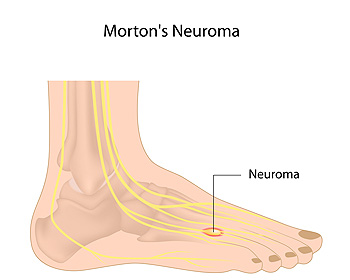 If you are experiencing pain in the toe area of your foot, you may have a condition that is referred to as Morton’s neuroma. It may generally develop as a result of the nerves, that provide sensation between the toes, becoming compressed. Typical symptoms that may develop from this ailment may be intense pain or a burning feeling and may often be noticed on the bottom of the foot that extends to the toe area, which may cause walking to become difficult. Research has shown that it may develop by wearing improper footwear, which may include specific styles of high heels. Additional reasons why Morton’s neuroma may happen may be a result of an injury that occurs to the nerves in the surrounding area, or foot conditions, which may include bunions, hammertoes, or abnormal arches. If you have pain that involves your toes, it is suggested to consult with a podiatrist to learn about correct treatment techniques for Morton’s neuroma.
If you are experiencing pain in the toe area of your foot, you may have a condition that is referred to as Morton’s neuroma. It may generally develop as a result of the nerves, that provide sensation between the toes, becoming compressed. Typical symptoms that may develop from this ailment may be intense pain or a burning feeling and may often be noticed on the bottom of the foot that extends to the toe area, which may cause walking to become difficult. Research has shown that it may develop by wearing improper footwear, which may include specific styles of high heels. Additional reasons why Morton’s neuroma may happen may be a result of an injury that occurs to the nerves in the surrounding area, or foot conditions, which may include bunions, hammertoes, or abnormal arches. If you have pain that involves your toes, it is suggested to consult with a podiatrist to learn about correct treatment techniques for Morton’s neuroma.
Morton’s neuroma is a very uncomfortable condition to live with. If you think you have Morton’s neuroma, contact Dr. Jeffrey Wachtel of Wachtel Family Foot Care. Our doctor will attend to all of your foot and ankle needs and answer any of your related questions.
Morton’s Neuroma
Morton's neuroma is a painful foot condition that commonly affects the areas between the second and third or third and fourth toe, although other areas of the foot are also susceptible. Morton’s neuroma is caused by an inflamed nerve in the foot that is being squeezed and aggravated by surrounding bones.
What Increases the Chances of Having Morton’s Neuroma?
- Ill-fitting high heels or shoes that add pressure to the toe or foot
- Jogging, running or any sport that involves constant impact to the foot
- Flat feet, bunions, and any other foot deformities
Morton’s neuroma is a very treatable condition. Orthotics and shoe inserts can often be used to alleviate the pain on the forefront of the feet. In more severe cases, corticosteroids can also be prescribed. In order to figure out the best treatment for your neuroma, it’s recommended to seek the care of a podiatrist who can diagnose your condition and provide different treatment options.
If you have any questions, please feel free to contact our office located in Lansdale, PA. We offer the newest diagnostic and treatment technologies for all your foot care needs.




